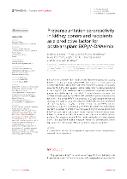Pretransplantation seroreactivity in kidney donors and recipients as a predictive factor for posttransplant BKPyV-DNAemia

Autor
Ludvíková, Viera
Hamšíková, Eva
Datum vydání
2022Publikováno v
Frontiers in ImmunologyRočník / Číslo vydání
13 (July)ISBN / ISSN
ISSN: 1664-3224ISBN / ISSN
eISSN: 1664-3224Metadata
Zobrazit celý záznamKolekce
Tato publikace má vydavatelskou verzi s DOI 10.3389/fimmu.2022.929946
Abstrakt
BK polyomavirus (BKPyV) often reactivates after kidney transplantation, causing BKPyV-associated nephropathy (BKPyVAN) in 1-10% of cases with a potential detrimental effect on allograft survival. Kidney transplant recipients are regularly screened for BKPyV DNA in plasma. As this strategy may not always reduce the risk of BKPyVAN, other predictive markers are needed. To evaluate the role of pretransplant BKPyV-specific antibody, 210 kidney transplant recipients and 130 donors were screened for BKPyV DNA and BKPyV-specific antibodies. We found that the donor BKPyV immunoglobulin G (IgG) seroprevalence and antibody level were strongly associated with BKPyV-DNAemia and BKPyVAN, although multivariant analysis found the presence of anti-BKPyV-specific antibodies as a predictive factor only for BKPyV-DNAemia. The pretransplant recipient status had no effect on posttransplant BKPyV-DNAemia and BKVAN. BKPyV IgG levels remained stable in BKPyV-negative recipients during 1-year follow-up, while a considerable increase was observed in BKPyV-positive patients. The presence of anti-BKPyV-specific antibodies in kidney allograft donors is a good and reliable predictive marker for posttransplant BKPyV replication with relevance to risk stratification in transplant recipients.
Klíčová slova
BK polyomavirus (BKPyV), BKPyV-associated nephropathy, kidney transplantation, seroreactivity, seroprevalence
Trvalý odkaz
https://hdl.handle.net/20.500.14178/1653Licence
Licence pro užití plného textu výsledku: Creative Commons Uveďte původ 4.0 International







